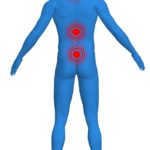By David Blyweiss, M.D., Advanced Natural Wellness
October 3, 2016
- Little-known cause of inflammation
- Can stress really give you a heart attack?
- Here’s what you can do to address the stress
Let’s face it. Nobody likes being stressed out. It makes you feel out of sorts, messes with your mind and can send you into a tailspin.
But hey… that’s life, right? You deal with it and move on.
If only it were that easy.
For the most part, folks don’t actually deal with their stress. Instead, they hold it inside. Eventually, the tension builds into a state of constant worry and anxiety. It can become such a normal part of your life that you may not even realize you’re carrying it around.
However the cumulative effects of all this stress can do a lot more than leave you feeling tense and strained. It also sets off a chain reaction that places your body in an inflammatory state.
Now, you’ve probably heard of cortisol. It’s one of the hormones your body produces when you’re threatened. And it works great in a fight or flight scenario…acutely.
MD Exposes the Hidden Danger to Your Eyes

When your eyesight starts to fail, it's a real problem. Suddenly you can't go to the grocery store... you can't get to the doctor if you have an emergency... you can't meet your friends for dinner…
Your "regular" doctor doesn't have time to keep up with the latest research. And the same goes for eye doctors. They go to school to learn how to fit you for glasses and contacts, but have no way of preventing the damage and loss of eyesight that threatens your freedom and independence.
Let me show you something that explains a LOT about how your eyes work.
In my FREE Special Report, I'll show you a HUGE, untapped resource for your eyes that safely and naturally restores clear, effortless eyesight.
Click here to get started...
But when you’re chronically stressed, your body keeps producing more and more cortisol. Over time, the cells in your body become resistant to it. And this is where the real problems occur.
When your body stops responding to cortisol, inflammation is given free reign to run amok throughout your body. This is bad news if you’re trying to avoid heart disease, diabetes, arthritis and other health issues associated with aging.
Can Stress really give you a Heart Attack?
The underlying cause of most age-related disease today is inflammation. This is why I often discuss the importance of eating an anti-inflammatory diet.
Organic, antioxidant-rich fruits and vegetables… healthy fats and oils… plenty of wild-caught fish that’s loaded with heart-healthy omega-3 fatty acids. These all have a place in your diet if you want to shut down inflammation.
But it’s equally important to address the stress that may be undermining all of your good intentioned efforts.
Stress places you at a much higher risk of heart disease. For example, every-day job stressors like workplace injustices, pay inequality and job-related tension could boost your chance of heart disease by more than 50%.In fact job dissatisfaction is one of the greatest causes of chronic stress.
Tack on the stress you get at home, financial worries and traumatic life events, and it can set you up for a heart attack at an early age.
Part of the reason for this is that, when you’re stressed, your immune system produces pro-inflammatory cytokines. Several of these substances, such as interleukin-6 (IL-6) and C-reactive protein (CRP), are associated with plaque build up and heart disease.
The World's Quickest Solution for Ending Prostate and Urinary Misery
This has recently been revealed to be one of the only real breakthroughs in prostate health.
The seeds of a strange fruit (sometimes called "Chinese Apples") hold powerful phytonutrients that are a revolution in prostate health.
In fact, UCLA and Veterans Administration research have now proved this to be true.
Not only that, but it may be the worlds quickest solution for ending prostate misery.
Simply stated, these phytonutrients represent a huge step beyond beta sitosterol, saw palmetto, and other phytosterols alone.
Simply click HERE if you want to have fast prostate relief...restful, uninterrupted sleep...no more constant "urges to go"...enhanced virility...and optimal prostate support for life.
Stress ages you more quickly. It shortens your telomeres, the protective DNA caps on the end of your chromosomes. Telomeres are like a built-in time clock. They get shorter every time your cells divide. The shorter they become, the more quickly you age.
Stress shrinks your brain. Chronic stress can cause your hippocampus to shrink. This is the part of your brain where long-term memories are formed. So it’s no surprise that a shrinking hippocampus is associated with memory problems and further, dementia and Alzheimer’s disease.
Stress is also associated with diabetes and metabolic syndrome, asthma, arthritis, digestive issues, headaches/migraines and even obesity. So it’s not something you should take lightly.
Address the Stress
Deep breathing exercises, meditation and getting a good night’s sleep are three things you can immediately start doing to help reduce your stress levels. Acupuncture and massage therapy are also great stress relievers.
But I find that many of my patients respond best to a structured Hatha yoga program.
This is the type of yoga most practiced here in the U.S. The reason I like it is because it not only promotes physical health, it also includes breathing techniques and meditation to help you de-stress and gain mental clarity.
I believe it’s this mind-body connection that makes it so effective when it comes to developing a natural peace of mind to help you overcome stressful events in your life.
Just as important, practicing yoga can offset many of the damaging health effects that come with stress, anxiety and negative feelings.
Taking part in regular yoga sessions can also lower both inflammatory markers I mentioned earlier – CRP and IL-6. It also improves cardiovascular health, lowers body weight and helps improve insulin sensitivity.
SOURCES:
Cohen S, et al. Chronic stress, glucocorticoid receptor resistance, inflammation, and disease risk. Proc Natl Acad Sci U S A. 2012 Apr 17; 109(16): 5995–5999.
Kivimäki M, et al. Work stress in the etiology of coronary heart disease–a meta-analysis. Scand J Work Environ Health. 2006 Dec;32(6):431-42.
Black PH. The inflammatory response is an integral part of the stress response: Implications for atherosclerosis, insulin resistance, type II diabetes and metabolic syndrome X. Brain Behav Immun. 2003 Oct;17(5):350-64.
Rosengren A, et al. Association of psychosocial risk factors with risk of acute myocardial infarction in 11119 cases and 13648 controls from 52 countries (the INTERHEART study): case-control study. Lancet. 2004 Sep 11-17;364(9438):953-62.
Epel ES, et al. Accelerated telomere shortening in response to life stress. Proc Natl Acad Sci U S A. 2004 Dec 7;101(49):17312-5.
Mah L, et al. Can anxiety damage the brain? Curr Opin Psychiatry. 2016 Jan;29(1):56-63.
Kiecolt-Glaser JK, et al. Stress, inflammation, and yoga practice. Psychosom Med. 2010 Feb;72(2):113-21.






